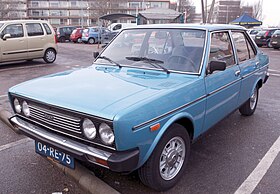Fiat 131 Abarth
| Fiat 131 | |
|---|---|

Fiat 131 (Series 1)
|
|
| Overview | |
| Manufacturer | Fiat |
| Also called |
|
| Production | 1974–1984 |
| Assembly |
|
| Body and chassis | |
| Class | Family car |
| Body style | |
| Layout | Front-engine, rear-wheel-drive |
| Related |
|
| Powertrain | |
| Engine | |
| Transmission | |
| Dimensions | |
| Wheelbase | 2,490 mm (98.0 in) |
| Length | 4,230 to 4,264 mm (166.5 to 167.9 in) |
| Width | 1,644 to 1,651 mm (64.7 to 65.0 in) |
| Height | 1,381 to 1,411 mm (54.4 to 55.6 in) |
| Kerb weight | 950 to 1,145 kg (2,094 to 2,524 lb) |
| Chronology | |
| Predecessor | Fiat 124 |
| Successor | Fiat Regata |
The Fiat 131, additionally called Mirafiori, is a medium family car produced by the Italian car manufacturer Fiat from 1974 to 1984. It was exhibited at 1974 Turin Motor Show.
The 131 was the replacement for the successful Fiat 124, and available as a two-door and four-door saloon and 5-door estate. The 131 was given the Mirafiori name after the Turin suburb where the cars were produced. Naming the car in this way marked a break with the former Fiat convention, established in the 1960s, of naming their mainstream models only with a three digit number, and it set the pattern for Fiat to adopt a new naming practice, with carefully chosen names for subsequent new models. Initially, the 131 was offered with 1.3 L and 1.6 L overhead valve engines. Revisions were made in 1978 and 1981, and all models were produced until production ceased in 1984.
In total, 1,513,800 units were produced in Italy.
The Fiat 131 employed construction techniques and technologies typical of its day. The body was a steel monocoque. Designed and styled on the typical three-box design, with distinct boxes for the engine compartment, passenger compartment, and boot.
The major mechanical components were also conventional and contemporary, but with some notable advances. The 131 employed a front engine, rear-wheel drive layout, whereby the engine is longitudinally mounted in the front of the car. The gearbox is directly behind the engine, and a tubular propeller shaft, under the transmission "tunnel", transmits the drive to a solid live rear axle.
...
Wikipedia
